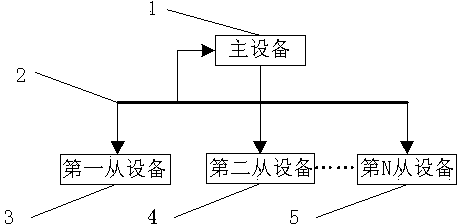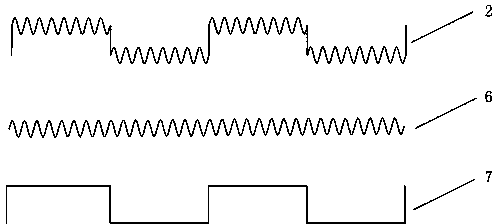Method for achieving synchronous collection of multiple devices through single-channel analogue signal
A technology for synchronous acquisition and analog signal, applied in the direction of synchronization device, measurement device, instrument, etc., can solve the problem of affecting the accuracy of analog signal acquisition, affecting the synchronization accuracy between devices, and phase delay error between signals, so as to avoid high-frequency digital interference. Noise influence, good usability, effect of avoiding phase delay errors
- Summary
- Abstract
- Description
- Claims
- Application Information
AI Technical Summary
Problems solved by technology
Method used
Image
Examples
Embodiment 1
[0025] The method of the invention is used to realize synchronous collection of three devices. The collection devices are master device 1 , first slave device 3 and second slave device 4 respectively. The first acquisition module 10, the second acquisition module 14 and the third acquisition module 17 are all NI 9232, the first controller 9, the second controller 13 and the third controller 16 are all NI 9025, the first chassis 8, the third Both the second chassis 12 and the third chassis 15 are NI 9118, and the analog output module 11 is NI 9263.
[0026] The analog output module 11 in the master device 1 produces a single analog composite signal 2, which is sent to the master device 1, the first slave device 3 and the second slave device 4 at the same time, the first acquisition module 10 of the master device 1, the first slave device The second collection module 14 of the device 3 and the third collection module 17 of the second slave device 4 respectively receive and coll...
PUM
 Login to View More
Login to View More Abstract
Description
Claims
Application Information
 Login to View More
Login to View More - R&D
- Intellectual Property
- Life Sciences
- Materials
- Tech Scout
- Unparalleled Data Quality
- Higher Quality Content
- 60% Fewer Hallucinations
Browse by: Latest US Patents, China's latest patents, Technical Efficacy Thesaurus, Application Domain, Technology Topic, Popular Technical Reports.
© 2025 PatSnap. All rights reserved.Legal|Privacy policy|Modern Slavery Act Transparency Statement|Sitemap|About US| Contact US: help@patsnap.com



